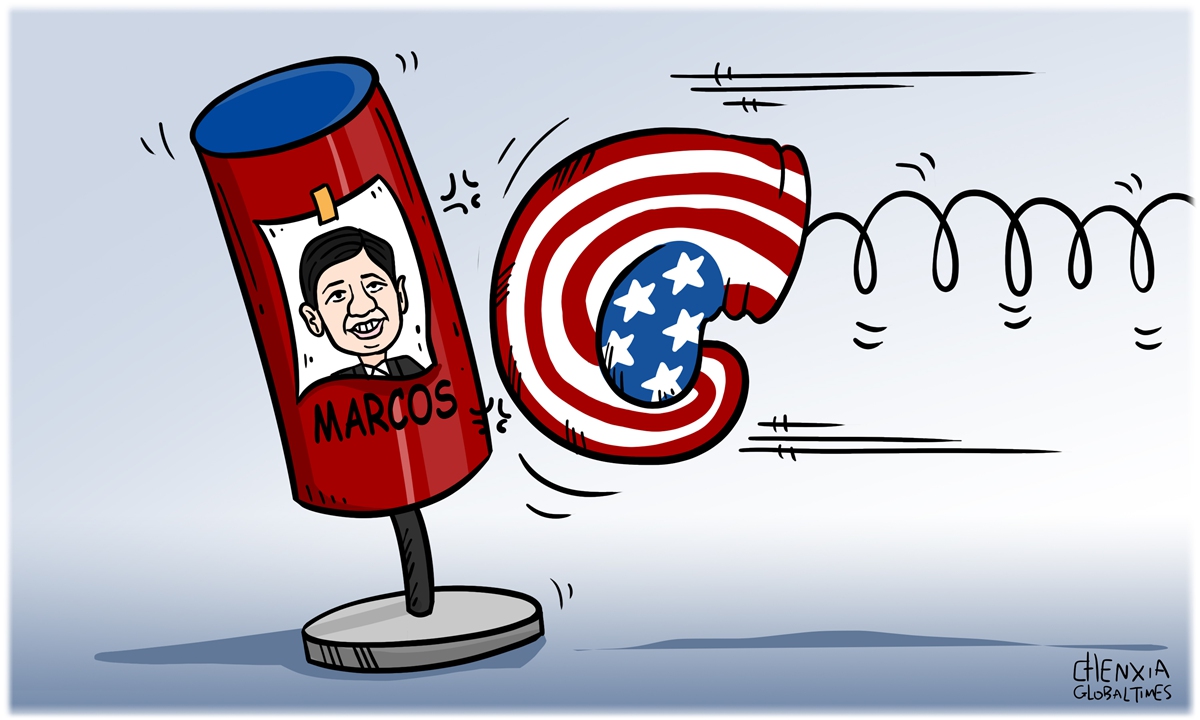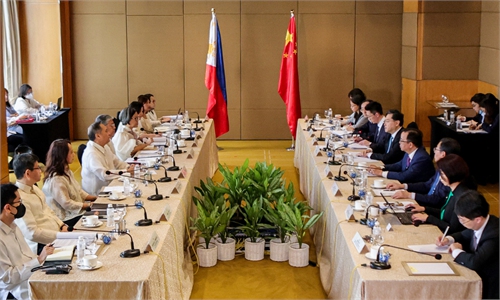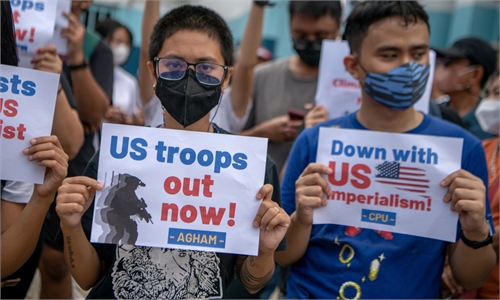
Philippine election. Illustration: Chen Xia/Global Times
Philippine President Ferdinand Marcos Jr. has embarked on his four-day visit to the US and is expected to meet US President Joe Biden on Monday afternoon, US time.
According to Reuters citing US officials, they will agree to new guidelines aimed at strengthening military cooperation. When announcing the meeting, the White House said in a statement on April 20 that Biden will reaffirm the US' "ironclad commitment" to the defense of the Philippines.
The "commitment" the US referred to is on the basis of the 1951 Mutual Defense Treaty, the 1998 Visiting Forces Agreement and the 2014 Enhanced Defense Cooperation Agreement between the US and the Philippines.
The US commitment to its allies is always a case of smoke and mirrors. From events in Afghanistan and Ukraine, it can be seen how unreliable US commitments are. When the US' own interests or national security is jeopardized, Washington abandons its commitments without any hesitation, said the experts.
Song Zhongping, a Chinese military expert and TV commentator, told the Global Times that the "ironclad commitment" is not to offer any security guarantee to the Philippines, but to the US itself, and that is what the US defense establishment needs.
"Wherever an 'iron' of its security shield becomes useless in US eyes, the US will abandon it and look for a new one. The US' global hegemony is to demand its allies to put on 'a suit of iron' for it," Song said.
Regarding the proposed military guidelines, Li Kaisheng, a research fellow and deputy director at the Institute of International Relations of the Shanghai Academy of Social Sciences, told the Global Times that they may include joint exercises and patrols and may even push forward cooperation with third parties such as Japan and Australia, which may complicate the regional security situation.
"The South China Sea disputes are only between China and relevant claimants. But with these arrangements, the US is not only extending its military presence to the region, but also bringing in other external powers. This makes the region subject to major power geopolitical competition, which undermines regional security and stability," Li said.
The US wants to pressure and drag in the Philippines into its Indo-Pacific Strategy, and make this Southeast Asian country a frontier military base and a chess piece aimed at containing China. Philippine media outlet 'Inquiry', citing experts, noted that "Washington sees the Philippines as a potential location for rockets, missiles, and artillery systems."
Nonetheless, Manila only wants US assistance in matters that concern its national interests such as the South China Sea disputes. In an interview prior to his US trip, Marcos said his government would not allow the Philippines to become a "staging post" for military action.
This reveals divergence between Washington and Manila. If the Philippines finds itself tied to the US, it will greatly jeopardize the national security of the Philippines. Experts pointed out that most ASEAN member states maintain balanced diplomacy between major powers and do not pick a side between China and the US. The Philippines should act in a prudent way and avoid becoming the weakest link in peace and stability in the South China Sea.
Li believes that the US is aiming to contain China by strengthening regional alliances, which may achieve certain results in a short period of time, because these countries can create some trouble for China. But from a long-term perspective, the effect will be limited.
"After all, the strength of these countries is limited and cannot replace the US role in US' attempt to contain China. On the other hand, the US will not place itself at the forefront in a clash with China. This means that US alliances cannot fundamentally contain the development momentum of China and the region," said Li.
While the US side tries to talk about security, Marcos said ahead of his visit that "one of my priorities for this visit is to push for greater economic engagement." Actually, the more urgent task the Philippine president is facing is economic development. For ASEAN and the Philippines in particular, China is a vast market, not a threat. China is also playing an important role in the construction and economic development of the Philippines. China should further strengthen this part of the role to realize the mutually beneficial and win-win relations and cooperation with the Philippines. In this way, the depth and breadth of economic and trade cooperation between China and the Philippines can replace the belligerent strategy pursued by the US.
The author is a reporter with the Global Times. wangwenwen@globaltimes.com.cn




